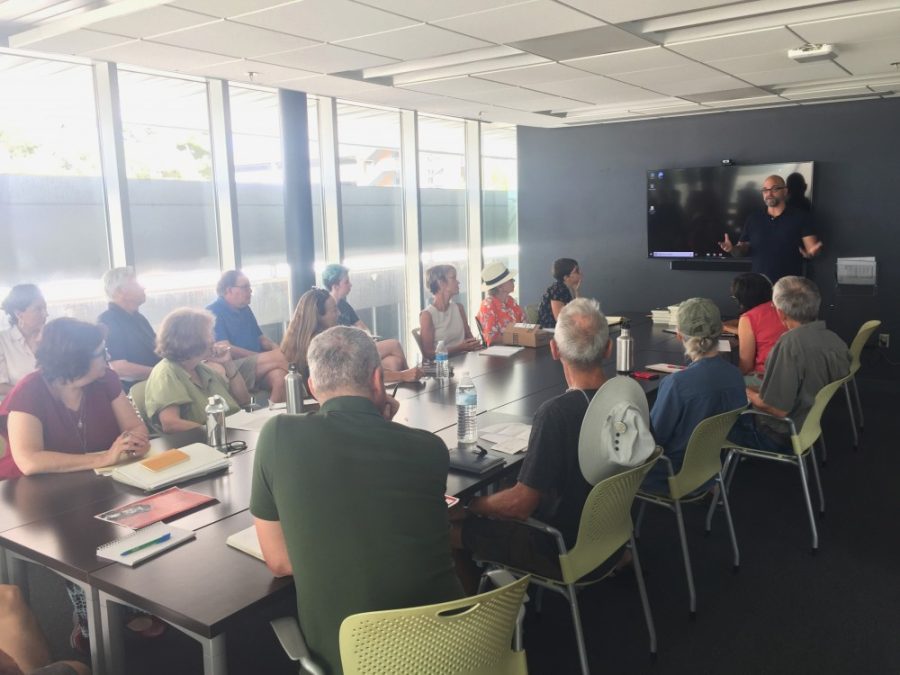The University of Arizona Poetry Center is shining the spotlight on social justice and criminal reform by giving opportunities to incarcerated writers to share authentic stories from behind bars.
The Poetry Center received a grant from the Art for Justice Fund in 2017 for a project that aims to open up a conversation about mass incarceration in the community. One of the programs that stemmed from this grant, “Free Time: Building a Community of Mentors for Incarcerated Writers,” is held one Saturday a month at the Poetry Center.
According to the American Friends Service Committee website, “the incarceration rate in the U.S. is the highest in the world, with over 2.4 million people currently behind bars.”
RELATED: UA Poetry Centerites for criminal justice reform with arts grant
This Reading & Lecture Series at the Poetry Center brings in poets such as Patricia Smith, Angel Nafis and Tongo Eisen-Martin to start a dialogue on a broken system that dehumanizes an entire population of people.
According to Bill Coan, a participating member of the writer’s workshop, a prison number is assigned to an individual the first time they enter the system and it is in sequential order.
The lower the number, the longer someone has been in the system, Coan said. Prisoners are judged and arranged into a hierarchy based on what numbers they are. As soon as they enter the system, they are no longer a person, they are a number.
Poetry Center Literary Director Diana Delgado said that the program’s poets will be able to visit local juvenile detention centers and facilities to do poetry readings and to give the participants free books.
“I think as an academic institution it is important for us to really broach complex topics,” Delgado said. “And I think it’s important that as a campus, we really think more about difficult topics that sometimes don’t have an answer.”
The workshop is led by writer and prison abolitionist, Joe Watson.
“I’ve always felt that I’ve written about things that, while maybe not important to the power brokers of the world, politics and things like that, but interesting to people on the margins,” Watson said. “I’ve always kind of written for, and about, people on the margins. Then I became someone on the margins by getting myself incarcerated.”
While he was incarcerated, Watson got involved with the Poetry Center because of an essay he wrote that got published in the magazine “Edible Baja.” He managed to contact a poet who eventually became a writing mentor to Watson while he was serving time.
“Let’s try to basically do for hundreds of incarcerated people across the country and in Arizona what one poet did for me,” Watson said. “Let’s connect them with folks who are writers on the outside, or who are aspiring writers, or whatever.”
The workshop was held on Saturday from 11 a.m. to 1 p.m. Everyone introduced themselves and spoke about why they had come to the workshop.
“What appeals to me about this workshop is that you’re using writing to work for social justice and to me that is incredibly valuable,” said Maria Russakoff, a participating individual in the workshop. “If your thing is art, do art. If you bike, do biking. But I like to write. So I feel really excited that there’s a venue for using writing to help society.”
RELATED: Q & A with State Poetry Champion and spitting poetry verses
There were many reasons why people aimed to participate in the workshop, but their common purpose was to create space for incarcerated writers and give individuals the opportunity to correspond with people on the outside.
After the group meetings, everyone came together. People started to share work from their correspondence with the incarcerated writers. They shared poems and essays that told the stories of these people who are showing their most authentic selves through writing.
Everyone gave positive feedback and wrote suggestions on the author’s work. They talked about the themes and the language that jumped out from the page.
The workshop allowed for members of the Tucson community to come together with a shared idea about bettering the lives of those who are incarcerated. It is open and free to anyone who wants to improve their own writing, as well as the writing of those in prison.
“[Let’s] start a dialogue to help incarcerated writers get that connection that people need,” Watson said. “That anybody needs, and that is especially healing and therapeutic to folks on the inside.”









